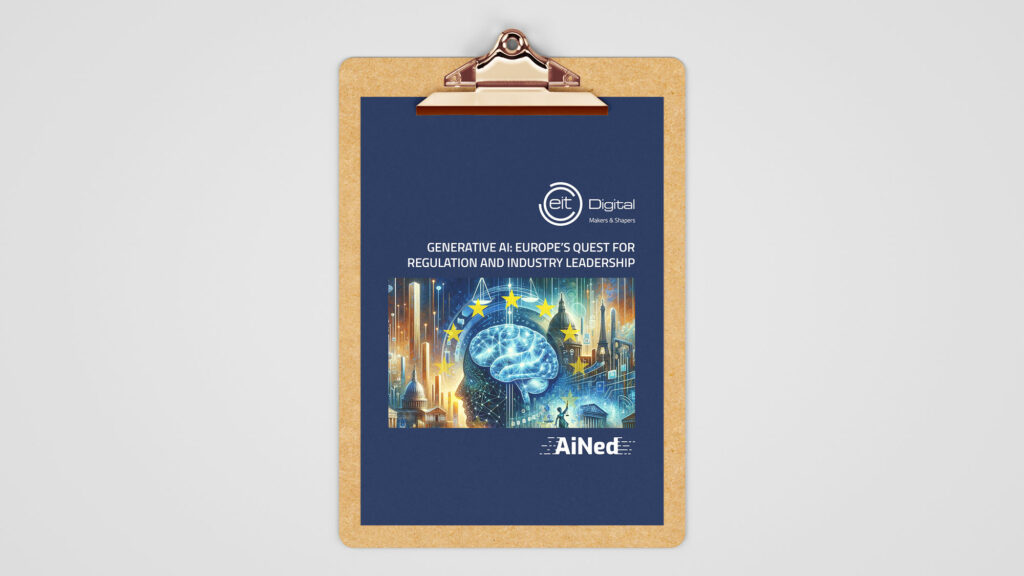Snippet
The report “Generative AI: Europe’s Quest for Regulation & Industry Leadership,” released on March 26, 2024, by AiNed and EIT Digital, highlights Europe’s position in the global AI race. It emphasizes the transformative potential of generative AI (GAI), while noting Europe’s challenges in keeping pace with the US and China due to fragmented initiatives and limited funding. The document recommends balancing regulation with innovation, boosting financial support, and addressing competition issues. It stresses the importance of navigating regulatory complexities to foster innovation and secure a leadership position in GAI, advocating for a future where Europe not only regulates but innovates, amidst global dynamics where America innovates, China replicates, and Europe traditionally regulates.
On March 26, 2024 the report “Generative AI: Europe’s Quest for Regulation & Industry Leadership” is released, created by AiNed and EIT Digital as part of the EIT Digital Makers & Shapers series. The report discusses the impact and development of generative AI in Europe, offering insights for decision-makers amid a rapidly changing innovation landscape.
It’s interesting the state of the art of AI development, with the USA and China in very advanced positions and the different legal treatment.
Generative AI: Europe’s Quest for Regulation and Industry Leadership

The report “Generative AI: Europe’s Quest for Regulation and Industry Leadership” explores the socioeconomic dynamics, regulatory challenges, and opportunities for Europe in the context of generative artificial intelligence (GAI). This summary article seeks to highlight the key points of the document, underscoring the key implications for Europe in the global landscape of artificial intelligence innovation.
Europe stands at a pivotal point regarding the development and regulation of generative artificial intelligence (GAI), aiming to navigate regulatory challenges and establish itself as a leader in the field. The report emphasizes how GAI, encompassing models capable of synthesizing new content (texts, images, codes, etc.) from vast volumes of data, has the potential to profoundly transform various socioeconomic aspects, from innovation to the quality of work.
However, Europe faces significant challenges, including lagging behind in the global competition, exacerbated by the absence of a cohesive European AI initiative and limited investments in European startups compared to US and Chinese giants. Despite this, the rapid evolution of GAI, catalyzed by the launch of OpenAI’s ChatGPT in November 2022, offers new opportunities for the integration of GAI solutions and for new players to enter the market.
The report also highlights the promises of GAI in enhancing productivity and improving work quality, while noting uncertainties regarding labor market impacts and societal implications. Particularly, there is concern about the impact on Europe’s cultural and linguistic diversity, given the dominance of large US and Chinese AI companies.
3 recommendations in the report
- Balance regulation and innovation: encourage proactive measures that balance innovation with ethical considerations, suggesting the adoption of regulatory “sandboxes” to allow for responsible experimentation.
- Funding: increase financial support, targeting open and collaborative ecosystems, and not just the big tech players.
- Competition issues: address uncertainties regarding competition policy and antitrust initiatives in the context of GAI, mitigating the risks of unfair competition practices.
The outlook for GAI in Europe hinges on careful navigation through regulatory complexities, fostering innovation, and collaborative efforts to ensure responsible development and deployment of AI technologies. By proactively embracing these challenges, Europe can position itself as a leader in shaping the future of GAI while upholding principles of trustworthiness, transparency, and societal well-being.
US innovation and EU regulations
America innovates, China replicates, Europe regulates.
The contrast between innovation in the US and regulation in Europe highlights a central dilemma in technological progress. While innovation is essential for developing new digital technologies, regulation plays a crucial role in protecting consumer interests, ensuring economic efficiency, and long-term innovation are not compromised. However, there’s a debate on whether regulations are always necessary, as they could potentially stifle innovation. As this dynamic unfolds, even our everyday apps are set to change, reflecting the continuous evolution of innovation and regulation in the digital sector.

About EIT and AiNed
EIT Digital and AiNed are prominent organizations focused on advancing digital innovation and education, as well as artificial intelligence (AI) development in Europe: together, EIT Digital and AiNed contribute to Europe’s strategic objectives in digital innovation and AI, working towards positioning the continent as a global leader in these critical areas of future technology and economic development.
EIT Digital
EIT Digital is part of the European Institute of Innovation and Technology (EIT), a body of the European Union. Its mission is to drive Europe’s digital transformation. EIT Digital focuses on fostering innovation and entrepreneurial talent in digital technology. It is a pan-European network that includes companies, startups, universities, and research institutes working together to create a thriving digital Europe. EIT Digital aims to develop and bring to market digital innovations that address global challenges, and to train the next generation of digital entrepreneurs and innovators.
AiNed
AiNed is a program initiated by the Dutch government to strengthen the Netherlands’ position in the field of artificial intelligence. The initiative aims to boost research, development, and application of AI technologies across various sectors within the country. It focuses on ethical, inclusive, and responsible AI development, ensuring that the advancements in AI benefit society as a whole. AiNed seeks to facilitate collaboration among businesses, research institutions, and government bodies to drive innovation and economic growth through AI, while also addressing societal challenges.
More information: link
